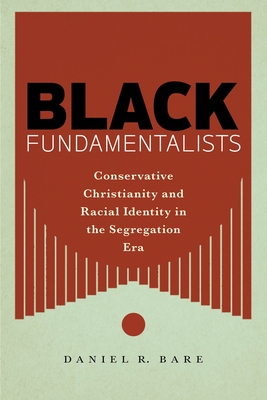Black Fundamentalists: Conservative Christianity and Racial Identity in the Segregation Era

Black Fundamentalists: Conservative Christianity and Racial Identity in the Segregation Era
Reveals the history of Black Fundamentalists during the early part of the twentieth century
As the modernist-fundamentalist controversy came to a head in the early twentieth century, an image of the "fighting fundamentalist" was imprinted on the American cultural consciousness. To this day, the word "fundamentalist" often conjures the image of a fire-breathing preacher--strident, unyielding in conviction . . . and almost always white. But did this major religious perspective really stop cold in its tracks at the color line? Black Fundamentalists challenges the idea that fundamentalism was an exclusively white phenomenon. The volume uncovers voices from the Black community that embraced the doctrinal tenets of the movement and, in many cases, explicitly self-identified as fundamentalists. Fundamentalists of the early twentieth century felt the pressing need to defend the "fundamental" doctrines of their conservative Christian faith--doctrines like biblical inerrancy, the divinity of Christ, and the virgin birth--against what they saw as the predations of modernists who represented a threat to true Christianity. Such concerns, attitudes, and arguments emerged among Black Christians as well as white, even as the oppressive hand of Jim Crow excluded African Americans from the most prominent white-controlled fundamentalist institutions and social crusades, rendering them largely invisible to scholars examining such movements. Black fundamentalists aligned closely with their white counterparts on the theological particulars of "the fundamentals." Yet they often applied their conservative theology in more progressive, racially contextualized ways. While white fundamentalists were focused on battling the teaching of evolution, Black fundamentalists were tying their conservative faith to advocacy for reforms in public education, voting rights, and the overturning of legal bans on intermarriage. Beyond the narrow confines of the fundamentalist movement, Daniel R. Bare shows how these historical dynamics illuminate larger themes, still applicable today, about how racial context influences religious expression.PRP: 333.77 Lei
Acesta este Prețul Recomandat de Producător. Prețul de vânzare al produsului este afișat mai jos.
267.02Lei
267.02Lei
333.77 LeiIndisponibil
Descrierea produsului
Reveals the history of Black Fundamentalists during the early part of the twentieth century
As the modernist-fundamentalist controversy came to a head in the early twentieth century, an image of the "fighting fundamentalist" was imprinted on the American cultural consciousness. To this day, the word "fundamentalist" often conjures the image of a fire-breathing preacher--strident, unyielding in conviction . . . and almost always white. But did this major religious perspective really stop cold in its tracks at the color line? Black Fundamentalists challenges the idea that fundamentalism was an exclusively white phenomenon. The volume uncovers voices from the Black community that embraced the doctrinal tenets of the movement and, in many cases, explicitly self-identified as fundamentalists. Fundamentalists of the early twentieth century felt the pressing need to defend the "fundamental" doctrines of their conservative Christian faith--doctrines like biblical inerrancy, the divinity of Christ, and the virgin birth--against what they saw as the predations of modernists who represented a threat to true Christianity. Such concerns, attitudes, and arguments emerged among Black Christians as well as white, even as the oppressive hand of Jim Crow excluded African Americans from the most prominent white-controlled fundamentalist institutions and social crusades, rendering them largely invisible to scholars examining such movements. Black fundamentalists aligned closely with their white counterparts on the theological particulars of "the fundamentals." Yet they often applied their conservative theology in more progressive, racially contextualized ways. While white fundamentalists were focused on battling the teaching of evolution, Black fundamentalists were tying their conservative faith to advocacy for reforms in public education, voting rights, and the overturning of legal bans on intermarriage. Beyond the narrow confines of the fundamentalist movement, Daniel R. Bare shows how these historical dynamics illuminate larger themes, still applicable today, about how racial context influences religious expression.Detaliile produsului









